
зеленый
.pdf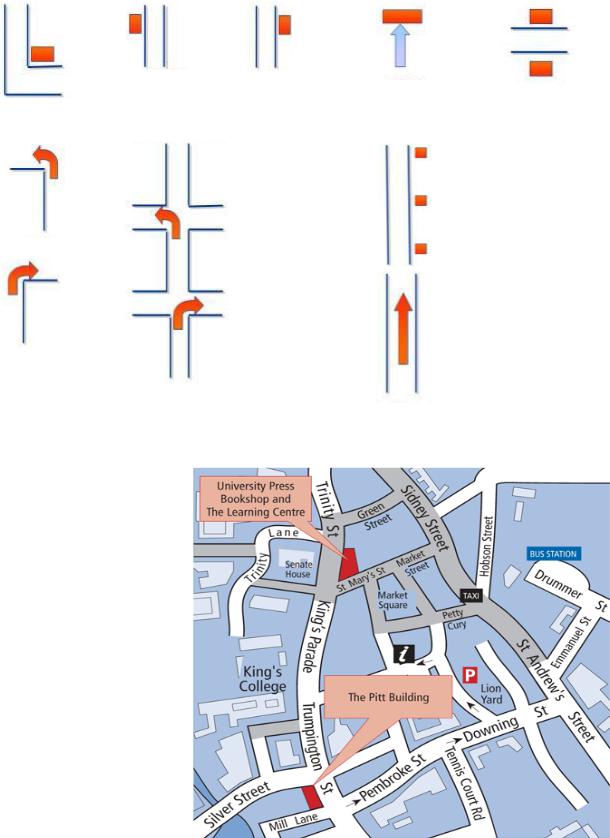
on the left |
on the right |
as far as |
opposite |
|
on the corner |
|
|
||
|
|
|
|
|
of |
|
|
|
at the end of |
|
|
|
|
|
|
take |
the |
|
half way down |
turn left |
second |
|
|
|
turning on the |
|
at the beginning of |
||
|
|
|||
|
left |
|
|
|
|
take the |
first |
|
straight ahead |
turn right |
|
|
||
turning on the |
|
|
||
|
|
|
||
right
4f Look at the map of Cambridge and make true sentences using the prepositions and the phrases below.
between
next to
in
opposite
It’s on the left/ right of the map.
It’s on the left/ right of the library.
It’s at the top/ bottom of the map.
12
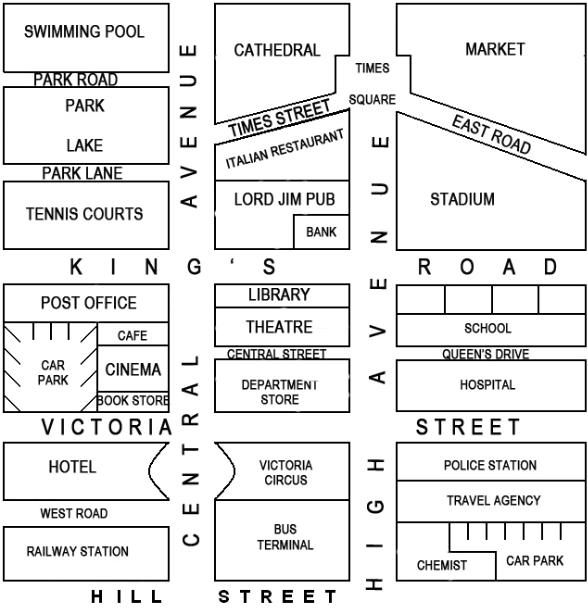
4g Using the expressions above and the map below do the following tasks.
1.Work in pairs. You are in the Travel Agency, in High Avenue. Ask about facilities: Is there a post-office near here? Are there any banks in the town?....
Ask for directions: Where´s the ….? How can I get to ….? Can you tell me the way to …?
Your partner answers about facilities and gives you the directions.
2.Imagine you live in the corner of 3. Your friend is at the railway station.
East Road and Times Square. A friend |
She/He rings you up because she/he |
of yours comes to visit you. Write him |
hasn´t got your letter with him/her. Act |
an e-mail describing her/him how to get |
out a short dialogue. |
to your house from the railway station. |
|
13

4h Where are you now? Write a text message to your friend.
5. Reading
Pre-reading activities
 5a Listen to the beginning of the tale and choose the topic from the list
5a Listen to the beginning of the tale and choose the topic from the list
below. Track 05. |
|
|
|
endangered animals |
eating habits |
country vs. city living |
living |
conditions |
|
|
|
 5b Listen again and put the following sentences into the correct order.
5b Listen again and put the following sentences into the correct order.
a‘That’s just my neighbour – the dog, he wants to join us for dinner.’
bSo one day, he invited his country cousin to stay with him in his town house.
cThe town mouse was a very superior mouse, who thought that living in the town was far better than living in the country.
d‘Thank you, but I think I will return to the peace and quiet of my own house after all!’
eThey sat down to a meal, which to the country mouse was a feast.
While-reading activities
5c Read the continuation of the story and choose the correct sentence from A-F to fill in gaps 1-5. There is one sentence that you won’t need to use.
AConversely, the introduction of city parks and forests, and traffic free zones, has helped in bringing a little of the countryside to the city streets.
BAfter work she meets with friends in a bar or restaurant before going on to a disco or nightclub.
CAlex, however, lives in a small village in the countryside.
DWhen you are tired of the noise, the traffic, and the stress, try to find peace and quiet.
14
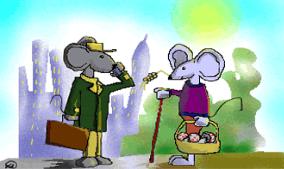
EMore than half the world’s population now lives in cities.
FToday, many town dwellers wish to reverse this trend and return to a slower pace of life like Alex, out modern ‘country mouse’.
Town or country mouse?
by John Russell
This simple tale (taken from Aesop’s famous stories) shows that what may be a good place to live for one person, may not be good for another. A modern version of this story might look like this: Maria lives in a big city surrounded by the speed and convenience of urban life. She works in an office with 1000 other employees, and travels to and from there on a crowded Metro. Her home is a flat overlooking a busy city-street, which is always alive with the sound of traffic and people passing by. 1) _____________
Weekends are spent in the shopping mall with its numerous shops, multiscreen cinemas, fast food and entertainment complexes.
2) ________________________
He cycles to work down country lanes every morning, the sound of tractors, birds and animals in his ears. In the evening, he relaxes at home in front of the fire with a good book to read. At weekends, he goes for long walks in the fields with his dog.
Unfortunately, life is not as simple as stories make it. A lot of today’s ‘town mice’ such as Maria would be happy to live in the country. Many modern cities have very large populations (Tokyo or Mexico City - over 25 million) and can be crowded, dirty and dangerous places to live.
3)____________________ In much of Europe and North America this can be as high as much as 80% of a country’s population. (According to the United Nations, approximately 1 billion people in cities are living in slum conditions – overcrowded and unhealthy).
The 18th Century marked the beginning of the Industrial Revolution, the depopulation of the countryside, and the move to towns. The towns became places of mass employment in factories and offices.
4)_______________ Yet, a modern country existence is not without its problems; poor transport, lack of access to hospitals and education, and services found in towns such as large shops, banks and entertainment.
The debate between town and country is meaningless these days, as so many people live in towns, and very few people are actually able to choose where they live; this is dictated by their work or birth. The internet and other mass media have linked country areas to the world, providing access to information – even to remote areas. If countryside,
15

other benefits of the city need to be available (employment, healthcare and education). 5) _____________.
The UN World habitat day (4th October) this year looks at this issue. It emphasises the need for strong links
between town and countryside, and their mutual dependence upon each other.
Are you a town mouse or a country mouse?
After-reading activities
5d Below are 10 sentences from the text, but the words are in the wrong order and the punctuation is missing. Put the words in the correct order and put in the punctuation?
1. |
civilised mouse town the city life |
6. large very modern have cities |
|
thought was |
populations |
2. |
peace quiet the and country |
7. to are live slums places overcrowded |
|
missed mouse |
th |
|
8. in 18 moved to countryside people |
|
3. |
Maria’s a busy house overlooks |
city the from century |
|
street city |
9. Internet in information the people to |
4. |
the shopping weekends goes to |
provides local areas |
|
Maria mall at |
10. the is World UN in October day |
5. |
reading of the Alex enjoys front |
habitat |
|
in fire |
|
5e Work with your partner to prepare a list of pros and cons of living in the city and in the country. Discuss this problem together to choose the most suitable for each of you. Support your position with the arguments from your list.
|
Living in the city |
|
Living in the country |
|||
|
PROS |
|
CONS |
|
PROS |
CONS |
1. |
|
1. |
|
1. |
|
1. |
2. |
|
2. |
|
2. |
|
2. |
etc. |
|
etc. |
|
etc. |
|
etc. |
6. Extra Activities: Life in an English village
6a How do you imagine a traditional English village? In pairs make some predictions.
6b Read the text and check if your guesses were right.
6c While reading chose the best word or phrase from the list below to fill in the gaps
16
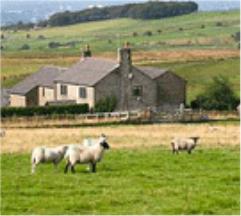
Fitting into village life
How to settle seamlessly into the rural English village community, from the international family's viewpoint.
Once a celebrated radio presenter in Shanghai, Maggie Zhang spoke to me about her experiences. She and her Scottish husband 1)______ a village near York in North Yorkshire shortly after their marriage. Five years later and still in the same village, she reflects on how she and her expanded family, they now have two children, find village life.
“Village life is wonderful for the kids,” says Maggie. “There is a great sense of 2) ____ here. Shanghai is all about money, money, money. Here it is more 3) ____ and you can't tell who has money and who hasn't.”
For Maggie, 4) ____ local people hasn’t been a problem. The post office has been the main place of contact and 5) ____ often greet her in the street. Through motherhood, attending post-natal classes and now as her children go to nursery she finds herself increasingly 6) _____
with the community, meeting new people and invited to children’s parties.
7) _____ of Maggie’s village are hardly multi-cultural, yet in her view seem easy going. Maggie hinted that even if local people are curious about her 8) _____ , so far no one has said anything.
“English people don't ask direct questions, unlike Chinese, English people ‘go around the moon to meet the sun.’"
Children, however, are much more 9) _____ and like any mother
her greatest worry is her children’s future and how they will 10) _____at school.
Five months ago, Claudia, a lawyer, and her British husband moved from Puerto Rico to a new housing 11) _____ within a village in Derbyshire to 12) ____ their daughter of two years.
13) _____ past experiences as an expatriate working in East Asia, the transition to England for Claudia has been made more difficult 14) ____
the isolation she feels through living in the country-side. “In a city it is easier to feel less like a 15) ____ than in rural areas.” she says, despite the 16) ____ of a rural village being “cheaper”.
For internationals 17) ____ city life, living in an English country village presents its own challenges. 18) ____, there aren’t so many facilities as in a city and transport links aren’t so well-developed. It can also be harder to find 19) ____
communities of internationals. For some expats it may be best to 20) ___
a village near a major city to
17
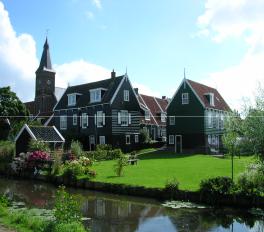
experience the best of both worlds. Country Life counsels people to take the advice of estate 21) ____ on choosing the right place to live and
identify the “five Ps: a pub, public transport, 22) ____ church, primary school and post office.”
1 |
A |
visit |
B |
have been to |
C |
moved to |
2 |
A |
People |
B |
Community |
C |
humour |
3 |
A |
Boring |
B |
Relaxed |
C |
funny |
4 |
A |
getting to know |
B |
to know |
C |
meet |
5 |
A |
Neighbours |
B |
Relations |
C |
managers |
6 |
A |
Experienced |
B |
Worried |
C |
involved |
7 |
A |
The authorities |
B |
The residents |
C |
The citizens |
8 |
A |
Background |
B |
Future |
C |
decision |
9 |
A |
Shy |
B |
Jealous |
C |
direct |
10 |
A |
get off |
B |
get along |
C |
get up |
11 |
A |
Place |
B |
Area |
C |
estate |
12 |
A |
bring up |
B |
bring along |
C |
bring about |
13 |
A |
Despite |
B |
In spite |
C |
Although |
14 |
A |
Because |
B |
because of |
C |
that’s why |
15 |
A |
Waiter |
B |
guest worker |
C |
foreigner |
16 |
A |
Income |
B |
Truth |
C |
advantage |
17 |
A |
used to |
B |
are used to |
C |
using |
18 |
A |
For instance |
B On the other hand |
C |
Moreover |
|
19 |
A |
Hostile |
B |
like-minded |
C |
remote |
20 |
A |
Selective |
B |
Selecting |
C |
select |
21 |
A |
Agents |
B |
Assistants |
C |
officials |
22 |
A |
Parish |
B |
Public |
C |
private |
6c Work in groups and read the ten tips for surviving in an English village . Think of your top ten tips for surviving in a Russian village.
Top tips for surviving in an
English village
Maggie and Claudia's suggestions for making a success of life in the English village are:
• Improve your language skills.
• Make an effort to be part of the community.
• Listen to the radio and read the news to stimulate conversation.
18

•Encourage your children to make local friends.
•Try to explore different places at weekends.
•“Recharge your batteries” by going to London every now and then to experience what a city has to offer
over a country village.
• Learn about gardening! English village communities love their gardens, so having a nice garden is a matter of pride and a good talking point!
7. Writing
7a Look at the Toronto City Fact file for tourists. Match these headings with the correct section 1-5 of the factfile.
General description. Location. Tourist attractions. Size. Climate.
|
|
|
City Factfile: Toronto |
1. |
|
. |
|
|
Toronto is in |
the southeast of Canada, in Ontario. It is on the lake Ontario. |
|
2. |
. |
||
In |
the summer |
Toronto is warm (250C) and in the winter it is very cold |
|
(-100C). |
|||
3. |
. |
||
|
|
|
|
Toronto is a big city. The population is 2.5 million. |
|||
4. |
. |
||
|
|
|
|
Toronto is a modern and busy city. There is a beautiful harbour. There are a lot of museums, theatres and restaurants.
5. .
Chinatown – there are a lot of restaurants and Chinese shops here.
The CN Tower – there is a restaurant and a theatre at the top of the tower. The views are wonderful.
Niagara Falls – this beautiful tourist centre is 160km from Toronto.
7b Adjectives make descriptions interesting. Write an adjective from the box next to the correct description.
|
|
busy |
beautiful |
wonderful |
modern |
warm |
|||
|
|
|
|
|
|
|
|||
1 |
It isn’t hot, it isn’t cold. |
|
It’s |
. |
|
||||
2 |
It’s new. |
|
|
It’s |
|
|
. |
|
|
3 |
It’s full of people, cars and noise. |
It’s |
|
|
. |
|
|||
4 |
It isn’t ugly. |
|
It’s |
|
|
. |
|
||
5 |
It’s very good. |
|
It’s |
|
|
. |
|
||
7c
Write a factfile for your city or a city you’d like to live in (100-150 words).
19

Unit 2
Wildlife
In this module you will:
Read about animal invaders
Role-play a conversation
Practise using much, many, little, a little, few; comparing animals
Listen to a telephone discussion
Write a project
Learn how to describe pictures
Useful vocabulary:
Nouns |
neighborhood, extinction, invader, damage, rescue worker, welfare, |
|
ban, decline, moratorium, harpoon, delicacy, whaling fleet, |
Verbs |
sabotage, variety, wildlife, a prohibition |
to escape, to decrease, to increase, to destroy |
|
Adjectives |
extinct, experienced |
Phrases and |
a front for something, to hunt for something |
collocations |
|
20
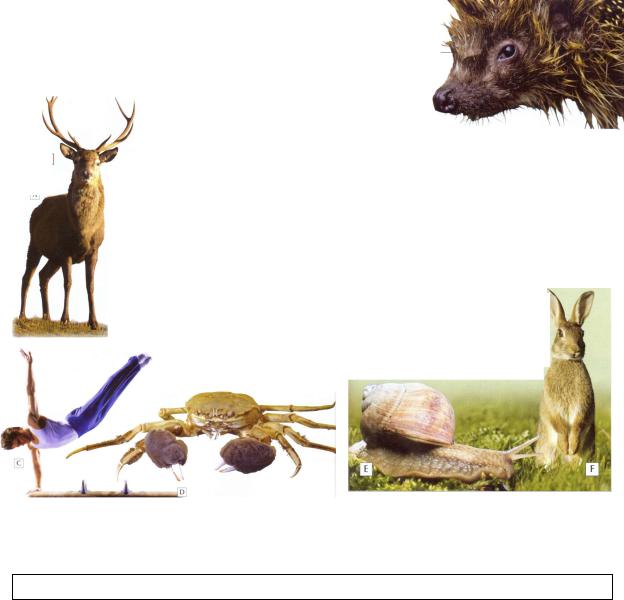
1.Lead-in
1a Which of these animals can you see in the photos?
crab red deer elephant giraffe
gorilla hedgehog human leopard monkey panda rabbit snail squirrel tiger
1b Which of the animals above do you have in your country? Which do you think are cute? Are any of them dangerous? Are any of them nearly extinct?
2.Reading
2a Pre-reading activity
Look at the headline of the article below. What do you think the article is about?
2b While-reading activity
Read the article and find out where these animals came from, where they invaded and who or what they caused problems for.
21
